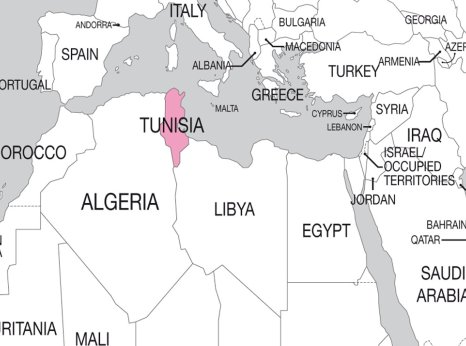Tunisia: Lawyer Arbitrarily Detained

Ahmed Souab is a prominent Tunisian lawyer and human rights defender known for his outspoken criticism of violations of fair trial rights, executive interference with judicial independence and executive overreach, particularly under President Kais Saied’s administration. He previously served as a judge at the Administrative Court and was a vocal critic of the dismantling of the rule of law following President Saied’s 25 July 2021 power grab. Souab represented several high-level victims of violations like Sonia Dahmani in addition to lawyers and political opposition activists Ghazi Chaouachi and Ridha Belhaj, both defendants in the “conspiracy case”.
On 19 April 2025, Ahmed Souab spoke in a press conference outside the Tunis Court of First Instance after the “conspiracy trial” was concluded in which 37 defendants including political opposition leaders were wrongfully sentenced on bogus charges of counter terrorism and conspiracy against the state. He had served as a lawyer representing several of the defendants and in his remarks, he criticized violations of due process that had taken place during the trial, executive interference in the judicial process and the lack of independence of the court.
Two days later, the Counter-Terrorism Brigade arrested Ahmed Souab and interrogated him in relation to these comments.
The counter-terrorism police unit held Souab in incommunicado detention for 48 hours, denying him access to his family and lawyer, before presenting him to the investigative judge of the Judicial Pole for Counterterrorism in Tunis.
On 23 April 2025. the judge ordered his pre-trial detention for six months pending investigation despite the lack of evidence suggesting involvement in any recognizable crime under international law. On 30 June 2025, the investigative judge concluded the investigation and formally charged Souab with “disclosing and spreading information directly or indirectly, by any means, for the benefit of terrorist organizations, or individuals connected to terrorist crimes, with the aim of assisting or facilitating their commission, or benefiting from them, or refraining from reporting them, or threatening to commit them. Such acts consist of providing or disclosing intentionally, to others, information that could endanger the safety of certain persons, or failing to report them,” under Articles 1, 13 (new), 30, 34, 40, 43, 78, and 81 of the Law No. 26 of 2015 on counterterrorism. Additional charges were brought against him related to using telecommunications networks and communication systems “to produce, transmit, or distribute news, statements, or false rumours, fabricated or forged documents, with the aim of attacking the rights of others, harming public order, national defence, or spreading panic among the population,” and “disseminating fabricated news, statements, or forged documents, containing personal data or false information likely to damage someone’s reputation, dignity, or honour, either personally or professionally, or to incite hatred against him through offensive speech.” under Article 24 of Decree Law 54 and Article 68 of the Telecommunications code.
Souab’s defense team appealed the judge’s decision but on 17 July the accusation chamber indicted Souab under the above-mentioned charges and referred him to trial. The trial is scheduled to open on 31 October 2025.
Souab’s arrest and prosecution came in direct retaliation for Souab’s work in defence of victims of human rights violations and the legitimate exercise of his right to freedom of expression and professional activities.
International human rights norms provide that lawyers should be able to carry out their professional functions without harassment or intimidation and protected as human rights defenders when they work to promote and protect rights, especially when representing victims of violations. By conflating legal advocacy with terrorism, the Tunisian authorities further undermine the right to fair trial, judicial independence and create a climate of fear that restricts human rights defenders from carrying out their essential work. Souab’s case is part of a broader campaign by Tunisian authorities targeting critics, including lawyers and human rights defenders.
Amnesty International has documented a pattern of misuse of counter-terrorism laws to prosecute peaceful dissent and a worrying trend of targeting lawyers representing members of political opposition groups, activists, and human rights defenders in Tunisia. In recent years, Tunisian authorities have prosecuted or harassed several lawyers, solely for defending political prisoners or publicly criticizing the judiciary and the executive.
The UN Basic Principles on the Role of Lawyers affirms that governments shall ensure that lawyers are able to perform all their professional functions without intimidation, hindrance, harassment or improper interference. The Basic Principles also provides in principle 18 that “lawyers shall not be identified with their clients or their clients’ causes as a result of discharging their functions.” Furthermore, principle 26 of the Basic Principles provides that “lawyers like other citizens are entitled to freedom of expression, belief, association and assembly. In particular, they shall have the right to take part in public discussion of matters concerning the law, the administration of justice and the promotion and protection of human rights and to join or form local, national or international organizations and attend their meetings, without suffering professional restrictions by reason of their lawful action or their membership in a lawful organization. In exercising these rights, lawyers shall always conduct themselves in accordance with the law and the recognized standards and ethics of the legal profession.” According to principle I(b)(iii) of the Principles and Guidelines on the Right to a Fair Trial and Legal Assistance in Africa, lawyers “shall not suffer, or be threatened with, prosecution or administrative, economic or other sanctions for any action taken in accordance with recognized professional duties, standards and ethics.”